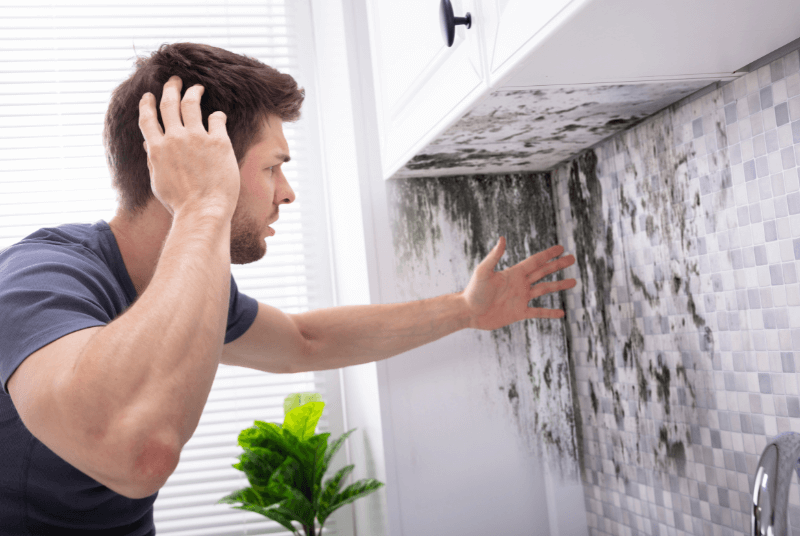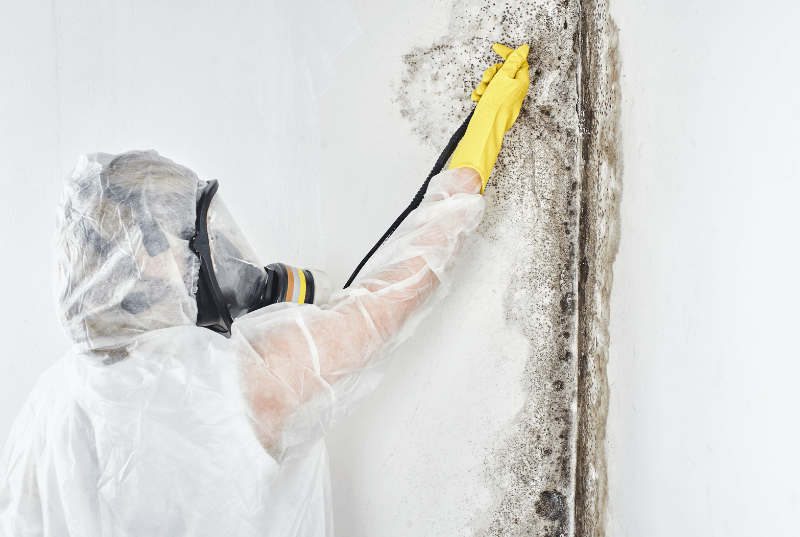
Mold in a house is one of the significant issues homeowners face when preparing to sell. While mold can be concerning, it’s not impossible to sell a house with mold issues. However, selling a house with mold requires additional steps and transparency.
What You Should Do if You Want to Sell a House with Mold
Mold problems can originate from various sources: leaking pipes, a leaking roof, or even poor air quality within the home. Regardless of the cause, homeowners aiming for a successful home sale should proactively address mold contamination.
Identify the Problem
The first step is to get a professional mold inspection. It’s essential to determine the types of mold present, whether it’s the infamous black mold or a less dangerous variety. An inspection can also pinpoint areas of concern like attics, crawl spaces, and drywall where mold growth can be rampant.
Mold Remediation
Addressing the mold problem through mold remediation is vital. This process involves mold removal and fixing the root cause, be it water damage, leaking pipes, or an HVAC system malfunction.
Transparent Communication
Honesty is crucial when dealing with potential buyers. It’s a known defect in real estate terms, and concealing it could lead to legal repercussions. If there’s a history of mold in the property, disclose it. While it might affect the home’s value, transparency can foster trust.
Consider a Cash Offer
Some real estate investors and Milwaukee home buyers specialize in buying houses as-is, meaning they buy properties with known defects, including mold damage. These cash home buyers in Shorewood and companies like can be a saving grace for homeowners looking to sell quickly without undergoing the extensive mold remediation process.
Can You Sell a House With Mold
The short answer is yes, but it can be more complex. Mold can be a sticking point in negotiations. Some of the challenges and considerations include:
Health Concerns
Mold exposure, especially black mold, can lead to health problems such as sneezing, runny nose, and more severe health issues. This concern can deter some interested buyers, especially if someone in their household is compassionate.
Financing Hurdles
Lenders may be hesitant to finance homes with known mold infestations, making it difficult for potential buyers to secure a mortgage.
Decreased Market Value
A home with mold, even if remediated, might not fetch the same market value as a mold-free property.
Home Inspection and Realtor Concerns
A home inspection will likely uncover mold issues, and realtors might hesitate to show properties with mold contamination. However, having a documented history of mold remediation can help assuage fears. It’s also good to refer to a preparing your house to sell checklist to ensure you’re addressing all potential pitfalls.
Prevention is Key
Even after mold remediation, homeowners should invest in preventive measures like dehumidifiers and regular checks for leaking roofs or pipes to ensure mold doesn’t recur.
For those facing mold issues, it’s also worth noting there are resources available. Consider checking out the documents you need to sell your house for guidance on necessary paperwork. There’s hope and potential for homeowners to navigate the process smoothly and secure a fair deal for their property.
Need To Sell Your House Fast With Mold?
We’re here to help.
Just fill out the form below or give us a call at: (414) 488-0082 to get your free, no-obligation cash offer!
How to Sell a House with Mold
Selling a house with mold demands a combination of diligence, honesty, and proactive measures. Begin by setting a competitive price, factoring in the mold issue and potential remediation costs. Next, present documentation of previous mold inspections and any remediation efforts made. Highlighting these can reassure potential buyers of the home’s safety.
Also, work with a realtor experienced in handling homes with mold issues; they can provide valuable advice and tap into a niche market of buyers who are open to such properties. Finally, stage the home well, emphasizing its positive features to divert some attention from the mold concern.
Fixing A House with Mold Before Selling
Mold infestation can be a considerable deterrent for potential buyers in the real estate market. If a homeowner discovers mold growth in their property before selling, taking proactive measures can prove advantageous for the property’s market value and the health of its inhabitants.
Understanding Mold and its Impact
Mold spores are ubiquitous in our environment. They become a concern when they find a conducive environment to grow and thrive, often characterized by moisture and organic material. This mold growth can manifest in various areas, from drywall and attics to crawl spaces and even HVAC systems.
Addressing the Mold Problem
Hiring professionals for mold inspection can provide a comprehensive view of the problem’s extent. Once identified, homeowners should engage in mold remediation. This process goes beyond mere mold removal. It encompasses identifying the root causes, such as water damage, leaking pipes, or poor air quality, and rectifying them to ensure mold doesn’t return.
Reassuring Potential Buyers
After mold remediation, homeowners should maintain a record of the process, ensuring they’ve addressed the problem comprehensively. This record can be shared with real estate agents and potential buyers, building trust and alleviating concerns.
Selling a House with Mold As Is
In some scenarios, homeowners might sell their property “as is” without undergoing mold remediation. While this route might seem quicker and less tedious, it has its considerations.
Why Sell As-Is?
There are various reasons homeowners want to sidestep the mold remediation process. The mold damage may be extensive, and the costs of fixing it are prohibitive. In other cases, the homeowner might face other challenges, like financial distress or a looming foreclosure, prompting a quick sale. Whatever the reason, selling a house as-is means the property is sold in its current condition, with all its known defects, including mold contamination.
Expectations and Market Value
When selling a house with visible mold or known mold history, homeowners should be realistic about the property’s market value. The presence of mold can significantly lower the home’s value, given the potential health issues and the costs associated with mold removal and repairs.
Finding the Right Buyer
Selling a home with mold can limit the pool of interested buyers. However, certain real estate investors specialize in buying homes in an as-is condition. These cash buyer entities can offer a lifeline to homeowners looking to offload their property swiftly. Their approach typically involves making a cash offer, which can be lower than the market rate but is quick and hassle-free.
In conclusion, whether a homeowner chooses to remediate mold issues or sell the property depends on their circumstances and priorities. In either case, transparency, due diligence, and understanding the market are paramount to navigating the complexities of selling a house with mold.

Renumerating House Buyer To Help Fix Mold Costs
When homeowners are confronted with mold issues, the potential costs for remediation can be daunting. The expenses can accumulate quickly from mold inspection to the actual removal process. However, in the real estate world, strategic ways exist to alleviate some of these costs and make the sale more attractive to potential buyers.
One innovative strategy involves renumerating or offering incentives to house buyers to cover some or all of the mold-related expenses. This approach provides a win-win situation for both parties.
Benefits for the Seller
Quick Sale: Mold can be a deterrent for many buyers. By offering financial incentives, homeowners can attract more potential buyers, leading to a faster sale.
Increased Property Appeal: Financial incentives can make a property with mold issues more competitive, especially when compared to similar homes without such offers.
Reduced Upfront Costs: Instead of the homeowner shouldering the mold remediation costs before listing, this strategy allows them to pass on the responsibility, making it more manageable financially.
Benefits for the Buyer
Financial Leverage: Buyers benefit from a monetary incentive, reducing the overall purchase price or offsetting the costs they would incur in mold remediation.
Customization: Handling mold remediation themselves allows buyers to select the professionals and processes they trust, ensuring the work meets their standards.
Increased Home Equity: After mold remediation, the home’s value often increases, offering buyers an immediate increase in home equity.
Implementation
To successfully implement this strategy, transparency is essential. Homeowners should be upfront about the presence of mold, its extent, and potential health implications. Home sellers can then propose a reduced sale price, a credit at closing, or other financial incentives to help potential buyers offset mold remediation costs.
Collaborating with a knowledgeable real estate agent familiar with mold issues is crucial. They can guide the process, ensuring all legal requirements, especially those related to known defects disclosure, are met.
Real estate investors, or those who proclaim “We buy houses in Waukesha,” are often more amenable to such arrangements. They have the expertise and resources to handle mold problems, making them ideal candidates for properties with significant mold issues.
Conclusion
Navigating the complexities of selling a home with mold can be challenging. However, with strategic planning and a focus on win-win solutions, homeowners can find ways to make their property appealing to buyers.
Sellers can expedite the sale process by offering financial incentives to address mold remediation costs and secure a favorable outcome. Transparency, collaboration, and flexibility can pave the way for success in the intricate dance of real estate transactions.
